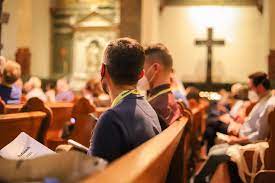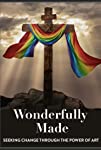Eye For Film >> Movies >> Wonderfully Made - LGBTQ R(eligion) (2022) Film Review
Wonderfully Made - LGBTQ R(eligion)
Reviewed by: Jennie Kermode

Coping day to day with discrimination, exclusion and hostility is hard enough for the average LGBTQ+ person. When, on top of that, one has to deal with being told that one is actually evil, being driven out of one’s spiritual community and told that one can expect to be tortured forever after death, well, it’s hard to imagine how people cope. Indeed, some don’t. This kind of treatment is a commonplace experience, however, for people who grow up in Catholicism, where there have even been efforts to blame LGBTQ+ people for priests raping children. Yuval David’s documentary looks at rebel officials within the Church itself who are trying to change the narrative.
It opens with an onslaught of religiously inspired homophobia which some viewers will find distressing to watch, followed by scenes of resistance put down by police. It’s a violent introduction to what is, overall, a very gentle film. It’s very personal for the director, who explains that his husband, Mark (a producer on the film), is Catholic, and that he has seen how badly he has been affected by exclusion. Other Catholics discuss their feelings about being rejected, supported by specifics and accounts of cases of suicide, but, having identified this problem, the film is primarily concerned with what can be done about it. This takes two forms: exploring and addressing the roots of the Church’s thinking on this matter, and following an art project which aims to provide outreach and succour to Catholic LGBTQ+ people through the creation of new, inclusive iconography.
Cinema audiences will, for the most part, not need to be told about the importance of the visual, but David wisely incorporates discussion of the psychological impact of the absence of imagery one can relate to, which is a big issue for people of colour as well. The power grab at the root of presenting the Palestinian-born Christ as a white man is problematic in itself, but still more so when one considers the specificity likewise attached to God, and the questions that leaves people asking when told that they were made in His image, as if something went wrong with them. On the contrary, the film asserts, quoting from Psalm 139, “You formed my inward parts; You knitted me together in my mother's womb. I praise you, for I am fearfully and wonderfully made.”
It is an antidote, of sorts, to centuries of restriction: using imagery to spark the imagination. We see it at the end of the film, in two forms; latterly the images themselves, but before that their effect on the film’s various speakers, amongst them a black gay man who has talked about being unable to imagine himself in the Creation story. It’s not clear how far these images will circulate, or how many people they will reach, but their very existence is a step forward.
The political side of the film treads more familiar territory, but still manages to raise some interesting questions, especially around the mystery of why the Church singles out LGBTQ+ people for much harsher treatment than most of those whom it considers to be guilty of sin. It looks at the reluctance of bishops even to condemn homophobic bullying, and at their efforts to block the creation of a US national suicide hotline because it would have supported LGBTQ+ people. It also observes the price paid by priests and nuns compelled by their conscience to go against official teaching even in studiously non-confrontational ways. These include Sister Jeannine Gramick, who explains how, after the Church refused to support her in offering comfort to LGBTQ+ people, she felt forced to step outside its bounds and continue the work on her own.
We also hear the voices of clergy members who are LGBTQ+ himself, including a priest who says that he had no difficulty being accepted by his congregation, with one woman telling him that there was nobody there who didn’t have some friend or relative in a similar situation. This sense of people pursuing a policy of truth and committing themselves to building community is perhaps the film’s strongest offering, and will provide encouragement to viewers who are themselves experiencing isolation.
What’s missing here is an opportunity for representatives of traditional Church thinking to defend it, but perhaps, after centuries of hearing their rhetoric, that isn’t really needed. There is also an absence of people who experience of rejection has led them to reject the Church and its teachings in return. Where David has succeeded, however, is in reaching out to those far less well provisioned people who long to be able to live openly and honestly within the spiritual framework in which they were raised, and offering them a means of reconnection to their faith.
Reviewed on: 25 Sep 2022
















